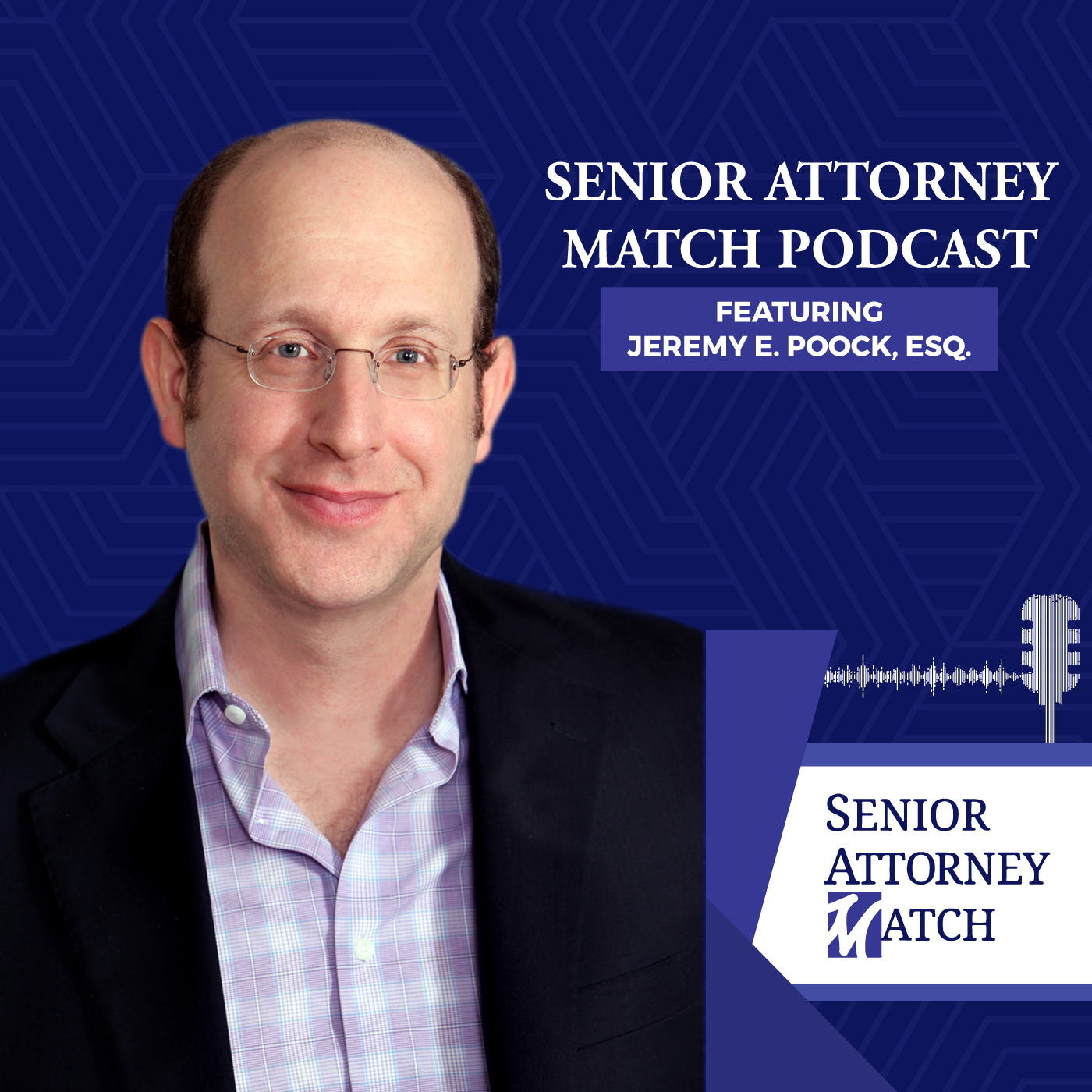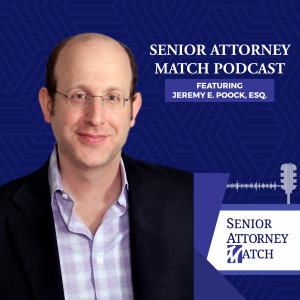
4.5K
Downloads
128
Episodes
The Senior Attorney Match Podcast addresses all topics relating to lawyers considering how to sell their law practices, including how to value a law practice, determining the "right" successor, when to start a transition toward retirement, and much more.
The Senior Attorney Match Podcast addresses all topics relating to lawyers considering how to sell their law practices, including how to value a law practice, determining the "right" successor, when to start a transition toward retirement, and much more.
Episodes

Tuesday Sep 26, 2023
Q&A Segment of Episode 3 of “The Ask the Law Firm Seller Show”
Tuesday Sep 26, 2023
Tuesday Sep 26, 2023
Episode 3 of the Ask the Law Firm Seller Show includes 3 segments. In Segment 1., host, Jeremy E. Poock, Esq., answers the following 3 questions: (1) How do I best prepare my law practice for sale? (2) If a Personal Injury Law Firm would not receive upfront money upon a sale, why not sell via a generous fee split upon the Seller’s open cases to another PI attorney? and (3) How often and under what circumstances will law firm sales generate an upfront payment?

Tuesday Sep 19, 2023
Episode 3 of “The Ask the Law Firm Seller Show”
Tuesday Sep 19, 2023
Tuesday Sep 19, 2023
Episode 3 of the Ask the Law Firm Seller Show includes 3 segments. In Segment 1, host, Jeremy E. Poock, Esq., answers the following 3 questions: (1) How do I best prepare my law practice for sale? (2) If a Personal Injury Law Firm would not receive upfront money upon a sale, why not sell via a generous fee split upon the Seller’s open cases to another PI attorney? and (3) How often and under what circumstances will law firm sales generate an upfront payment? In Segment 2, Poock welcomes Attorney Steve Horenstein of Schwabe, Williamson & Wyatt to discuss his experience after joining Schwabe in May 2022. And, in Segment 3., “Poock’s Post” addresses the following: When is the Right Time to Sell a Law Practice?

Tuesday Sep 05, 2023
Poock’s Post Segment of Episode 2 of “The Ask the Law Firm Seller Show”
Tuesday Sep 05, 2023
Tuesday Sep 05, 2023
Episode 2 of the Ask the Law Firm Seller Show includes 3 segments.
In Segment 3, host, Jeremy E. Poock, Esq., presents the following “Poock’s Post:” The Ongoing Disruption in Law Firm Values Caused by the Post-2020 3.0 Digital Era. Poock explains how Senior Attorneys who do not adopt Multi-Channel Digital Marketing during the Post-2020 3.0 Digital Era for the legal industry risk lower business development for new clients than yester-year for the following reason: Driven by convenience, today’s clients search “Uncle Google” for referrals for their legal needs rather than ask their brother, sister, best friend, accountant, financial planner, etc. as they did during the Pre-Google 1.0 Word-of-Mouth Era. And, in terms of the disruption that the Post-2020 3.0 Digital Era poses to law firm values, Poock states that for those lawyers “not adopting Multi-Channel Digital Marketing for their practices, their number of new clients is going to decrease. And, that . . . decrease in clients is also going to decrease the value of your practice.”

Tuesday Aug 29, 2023
Guest Appearance Segment of Episode 2 of “The Ask the Law Firm Seller Show”
Tuesday Aug 29, 2023
Tuesday Aug 29, 2023
Episode 2 of the Ask the Law Firm Seller Show includes 3 segments.
In Segment 2, host, Jeremy E. Poock, Esq., welcomes Attorney Harold Kestenbaum of Spadea Lignana to discuss Harold’s experience after joining Spadea Lignana in 2019. During their conversation, Harold debunks the following 3 fears that Senior Attorneys often have about selling their law practices by joining a Growing Law Firm: (1) Having a new boss after owning a law practice for many years; (2) Loss of control by joining a new law firm; and (3) Loss of identity by no longer running “the office.”

Tuesday Aug 22, 2023
Q&A Segment of Episode 2 of “The Ask the Law Firm Seller Show”
Tuesday Aug 22, 2023
Tuesday Aug 22, 2023
Episode 2 of the Ask the Law Firm Seller Show includes 3 segments.
In Segment 1., host, Jeremy E. Poock, Esq., answers the following 4 questions: (1) Why isn’t acquisition a larger strategic initiative for growth in the legal industry? (2) Please explain the typical options for selling a firm; (3) What are the 3 most important factors a young lawyer should consider before buying a practice? and (4) How will a lawyer know when it’s time to sell the law practice?

Thursday Aug 17, 2023
Episode 2 of “The Ask the Law Firm Seller Show”
Thursday Aug 17, 2023
Thursday Aug 17, 2023
Episode 2 of the Ask the Law Firm Seller Show includes 3 segments.
In Segment 1, host, Jeremy E. Poock, Esq., answers the following 4 questions: (1) Why isn’t acquisition a larger strategic initiative for growth in the legal industry? (2) Please explain the typical options for selling a firm; (3) What are the 3 most important factors a young lawyer should consider before buying a practice? and (4) How will a lawyer know when it’s time to sell the law practice?
In Segment 2., Poock welcomes Attorney Harold Kestenbaum of Spadea Lignana to discuss his experience after joining Spadea Lignana in 2019.
And, in Segment 3., “Poock’s Post” addresses the following: The Ongoing Disruption in Law Firm Values Caused by the Post-2020 3.0 Digital Era.

Tuesday Jul 12, 2022
Tuesday Jul 12, 2022
In this episode of the State of the Market for Law Firm Sales “In 7 Minutes,” Senior Attorney Match’s Jeremy E. Poock, Esq. addresses the following top 4 reasons why Growing Law Firms want & need Senior Attorneys and their staff:
(1) The instant client growth that Senior Attorneys present;
(2) The value of combining a Senior Attorney’s staff, together with the staff of a Growing Law Firm;
(3) The cumulative experience that Senior Attorneys and their staff present; and
(4) The marketing value that Senior Attorneys offer to Growing Law Firms in today's 3.0 Digital Era.

Thursday May 05, 2022
Thursday May 05, 2022
In this Trial Attorney practice area spotlight episode of the State of the Market for Law Firm Sales “In 7 Minutes,” Senior Attorney Match’s Jeremy E. Poock, Esq. welcomes Sam Dolce, Esq. of Milestone Consulting to discuss the benefits of Attorney Fee Deferral strategies for Trial Attorneys when selling their law practices.
Key points include:
- Trial Attorneys have 3 options when considering selling their practices
- An Attorney Fee Deferral strategy presents 3 benefits to Trial Attorneys
- To benefit from an Attorney Fee Deferral strategy, Trial Attorneys need to establish a Qualified Settlement Fund (QSF)

Tuesday Apr 05, 2022
The Top 3 Reasons Why Senior Attorneys Question Joining a Growing Law Firm
Tuesday Apr 05, 2022
Tuesday Apr 05, 2022
In this episode of the State of the Market for Law Firm Sales “In 7 Minutes,” Senior Attorney Match’s Jeremy E. Poock, Esq. addresses the following top 3 reasons why Senior Attorneys question joining a Growing Law Firm:
(1) “Now is not the time for change.”
(2) “I don't want a boss.”
(3) “This is the year that my Internal Successor will offer to purchase my practice.”
Key points include:
- Now is the right time for Senior Attorneys to consider selling their law practices because their 5 “Value Chips” have their highest value at this time in the early 2020’s.
- The 4 reasons why Senior Attorneys do not have a “boss” when they join Growing Law Firms.
- The 4 reasons why Internal Successors don’t want to purchase your law practice and can’t afford to either.

Monday Mar 07, 2022
Why Growth by Acquisition Has Arrived to the Legal Industry
Monday Mar 07, 2022
Monday Mar 07, 2022
In this State of the Market for Law Firm Sales “In 7 Minutes,” Senior Attorney Match’s Jeremy E. Poock, Esq. discusses why Growth by Acquisition has arrived to the Legal Industry.
Key points include:
- Senior Attorneys have what Growing Law Firms want and need.
- Growing Law Firms have 3 primary needs:
(1) A need for new clients;
(2) A need for an experienced workforce; and
(3) Digital Content for today’s 3.0 Digital Era for law firms.
- The following 2-fold benefits that Growth by Acquisition presents to Growing Law Firms:
(1) Pure Growth by Acquisition; and
(2) Cross-Marketing / Cross-Solving
